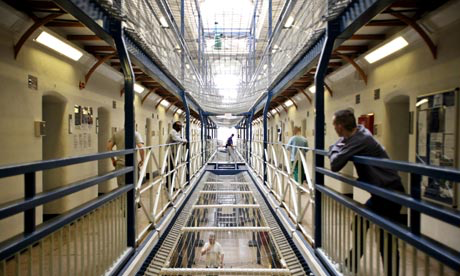Liz Truss urged to 'get a grip' of prisoners left languishing in jail beyond their sentences
One inmate imprisoned under controversial tariffs has so far served 11 years for a 10-month sentence.

Prisoners left "languishing in jail" years beyond their sentences under now-abolished tariffs should be given more help to be released, the chief inspector of prisons has said.
Peter Clarke said Justice Secretary Liz Truss must "get a grip" on a backlog of inmates serving under Imprisonment for Public Protection (IPP) tariffs who have already spent more than the maximum sentence for their crime.
In a report published on Thursday (17 November), he said "significant failings" in the prison system had left some inmates on IPP sentences unable to prove they were no longer a risk to the public.
Clarke said it was having a serious effect on prisoners' mental health, saying he met one inmate who said he felt "trapped in the system" having currently served seven-and-a-half years beyond his original sentence.
Another IPP prisoner, James Ward, told the BBC he feared he would never be released. He is in his 11th year in prison having only received a 10-month sentence for arson.
More than 3,800 prisoners in England and Wales are serving IPP sentences, which were introduced in 2005 and designed for those who had committed specified serious violent or sexual offences.
Under the sentences, which were abolished in 2012, high-risk individuals would serve a minimum term in prison but would only be released should they be able to prove to a Parole Board that they were no longer a risk to the public.
But Clarke's report said failings in the prison, probation and parole systems had left many inmates unable to show their risk had reduced, adding: "Not all IPP sentence prisoners could access the relevant offending behaviour programmes which enable them to demonstrate a reduction in their risk".
Clarke urged the justice secretary to "act quickly", saying it was now widely accepted the introduction of IPP sentences was "flawed".
"Some people with IPP sentences remain dangerous and need to be held in prison to protect the public. Others, however, present much lower levels of risks but system failures have impeded their progress," he said.
An inconvenient truth
Clarke's calls were echoed by the former justice secretary, Michael Gove, who said Truss should use her power of "executive clemency" to release 500 inmates.
His comments were made during the 2016 Longford lecture on Wednesday, which he used to make a public a U-turn over his refusal in office to reduce the record numbers of prisoners in jails across the country, currently at about 85,600.
"It is an inconvenient truth – which I swerved to an extent while in office – that we send too many people to prison. And of those who deserve to be in custody, many, but certainly not all, are sent there for too long," he said.
Gove called for the numbers to be reduced over time and pragmatically, saying criminals should not be sent to prison unless there was no alternative.
His speech, which abandoned the traditional Tory line that "prison works", also said those already serving time inside could be released even earlier than is currently possible should they succeed in courses or work programmes.
The Ministry of Justice said a new unit had been set up to tackle the problem concerning IPP sentences. A spokesman said: "Public protection remains our key priority, however this report rightly highlights concerns around the management of IPP prisoners.
"That is why we have set up a new unit within the Ministry of Justice to tackle the backlog and are working with the Parole Board to improve the efficiency of the process."
IPP sentences
- Between 2005 and 2012, a total of 8,711 IPP sentences were issued by the courts.
- As of September 2016, 3,859 of those prisoners were still in custody,
- Some 87% of these are beyond their tariff expiry date, with 42% five or more years over tariff.
© Copyright IBTimes 2025. All rights reserved.




















